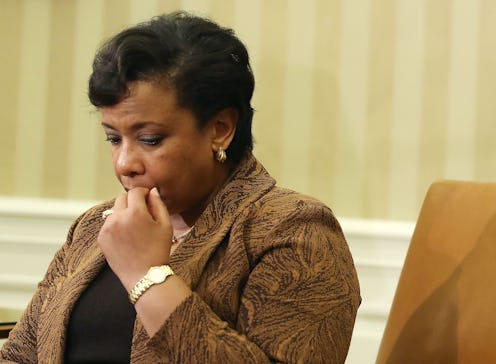News
Loretta Lynch Tried To Stop James Comey's Letter
James Comey, the director of the FBI, announced that his agency would be investigating a newly discovered batch of emails linked to Hillary Clinton. The decision was much maligned by both Democrats and Republicans, who found Comey's announcement to be a bizarre move, considering how close it was to the election. And as the New Yorker reported on Saturday, there was dissension even within the agency. Attorney General Loretta Lynch tried to stop Comey from sending the letter about the emails.
According to a "well-informed" administration official, Lynch wanted Comey to follow FBI protocol of not commenting on ongoing elections. Instead, Comey acted independently of Lynch and the department's policies by releasing the letter anyway. "You don’t do this,” a former senior Justice Department official told the New Yorker. “It’s aberrational. It violates decades of practice.” The former official also added that the reason Comey's letter was so controversial "is because it impugns the integrity and reputation of the candidate, even though there’s no finding by a court, or in this instance even an indictment.”
For his part, Comey realized that this is atypical. In the letter he wrote to lawmakers, he addressed the fact that this is a rare move for the FBI:
Of course, we don’t ordinarily tell Congress about ongoing investigations, but here I feel an obligation to do so given that I testified repeatedly in recent months that our investigation was completed. I also think it would be misleading to the American people were we not to supplement the record. At the same time, however, given that we don’t know the significance of this newly discovered collection of emails, I don’t want to create a misleading impression. In trying to strike that balance, in a brief letter and in the middle of an election season, there is significant risk of being misunderstood, but I wanted you to hear directly from me about it.
The Justice Department has a longstanding practice of not releasing potentially sensitive information that could influence an election. It's unclear if this latest release will impact Clinton's lead in the election just yet, but Politico noted that 67 percent of likely voters don't think Clinton is honest nor trustworthy, and 41 percent of undecided voters said that the WikiLeaks disclosures — emails which detailed several contentious things about her campaign — made them less likely to vote for Clinton.
So while it's unclear if this could possibly cost Clinton in the presidential election, Lynch was probably right to expect Comey not to send the letter. In a vicious election cycle in which both candidates are slinging mud at each other whenever chance they get, voters are particularly susceptible to information that could make their minds up for them. If Clinton was being indicted because of new information that would be one thing, but Comey only said in his letter that the emails "appear to be pertinent to our investigation." Yet, it looks like Comey's mishandling of this situation is the larger story, and Clinton could come out unscathed.
